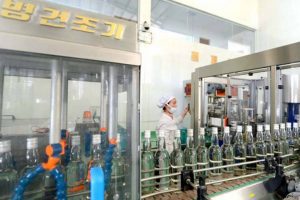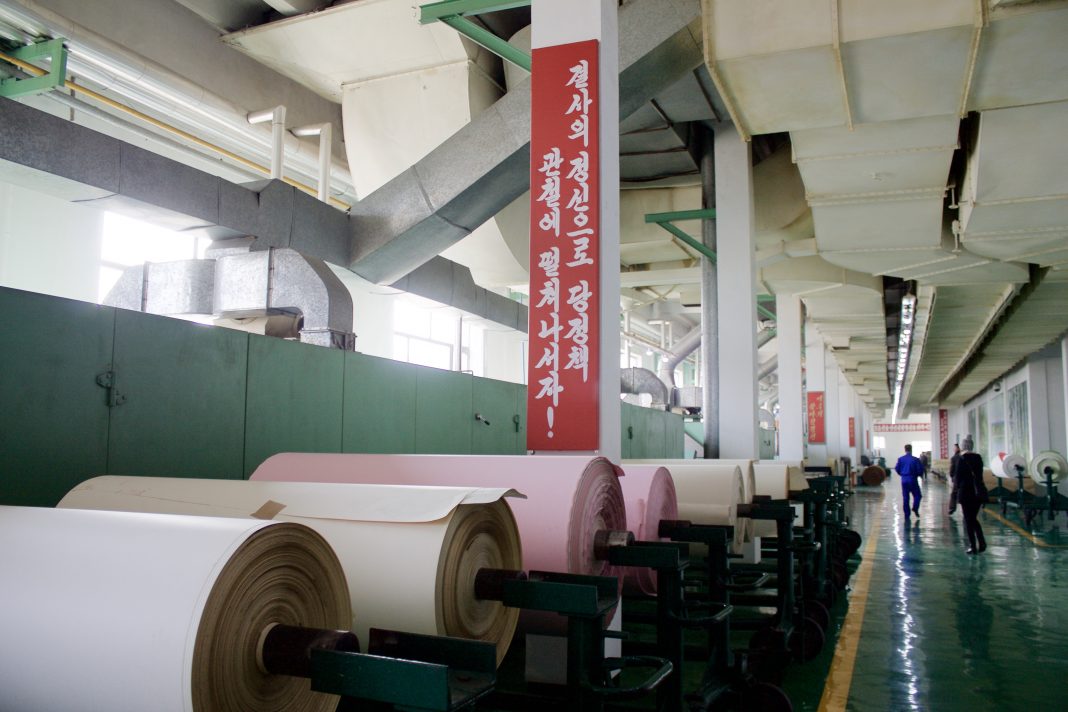North Korean leader Kim Jong Un emphasized increased productivity and a “frontal breakthrough” for the economy during the year-end plenary meeting of the Central Committee of the Workers’ Party of Korea (WPK). Daily NK sources, however, have reported slowed production at many of the country’s factories.
“Among the 180 or so enterprises in the Pyongsong region [near Pyongyang], there are around 35 factories,” a South Pyongan Province source told Daily NK on Dec. 9. “Less than half of these factories are producing at normal levels and, of those, only about five even pay monthly wages.”
The wages provided at those five factories, which are all state-run, are reportedly providing in-kind payments, rather than cash.
“Very few units pay market wages in cash. Most give their employees rice, corn, oil, flour and other goods,” the source said.
“The wages differ depending on the worker’s position, the type of work they do, how long they’ve worked and other factors, but on average it’s equivalent to about KPW 5,000 a month,” he added.
One kilogram of North Korean rice sells for about KPW 4,600–5,000 at local markets, meaning that workers are only being paid enough to afford one kilogram of rice.
Sources said that the average monthly wage at privately-run factories — such as those owned by the donjuLiterally "masters of money," donju refers to people who hav... More (North Korea’s entrepreneurial class) — are about 100 times the wages at a state-run factory.
While the average monthly wage at a state-run factory is in the range of KPW 5,000, sources reported that the monthly wage at a privately-owned factory is around KPW 500,000. Even so, privately-owned factories also tend to give their workers non-cash payments.
THE STATE STILL MAINTAINS CONTROL OVER BUSINESSES
Daily NK sources emphasized that, in general, businesses in North Korea are still under state control.
“It’s hard to claim that enterprises enjoy much autonomy from WPK control,” another Daily NK source said. “This is because managers of factories in North Korea must be Party members.”

Such remarks suggest that the Kim Jong Un regime’s vaunted “Socialist Enterprise Responsibility System,” which was introduced to increase factory production, has not been effective.
After assuming power in 2012, Kim introduced the system in 2014 in an amendment to the country’s “Enterprise Act.” Last April, the system was added to the country’s constitution.
The system is aimed at enhancing productivity and efficiency among the country’s businesses by granting a certain degree of autonomy to them in their operations, including business planning, raising funds, financial management, and how profits are used.
The system is often considered Kim Jong Un’s most important economic reform measure. Some experts have interpreted the significant increase in corporate autonomy – least in the area of production and distribution – as North Korea actively accepting elements of market capitalism.
NORTH KOREAN ECONOMY STILL STUCK IN OLD FRAMEWORK
Some Daily NK sources argue, however, that North Korea still remains mired in the framework of a planned economy.
“Individuals in North Korea have never been allowed to own any stakes in businesses, people have never made long-term investments in companies here. Instead they just make short-term investments to hurry along the production of certain goods to either take back their initial investment or collect earnings,” one Daily NK source said. “Many factories are overburdened by the state’s demands for production and are just scraping by.”
Despite these obstacles, some factories have managed to build highly lucrative businesses by actively soliciting investments and manufacturing marketable products, Daily NK sources said.
“The Pyongsong Food Factory has started to produce a mugwort-based alcohol and is raking in profits equivalent to seven to eight tons of corn,” one source said.
“Taking advantage of the fact that many North Koreans believe mugwort has medicinal properties, the factory solicited investments from wealthy individuals [donjuLiterally "masters of money," donju refers to people who hav... More], created an effective manufacturing process, and is currently supporting one technician and five workers with rations [such as rice and other grains], money to survive on, and food,” he added.
*Translated by Violet Kim
Please direct any comments or questions about this article to dailynkenglish@uni-media.net.


















